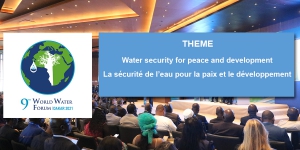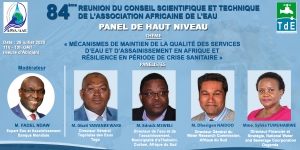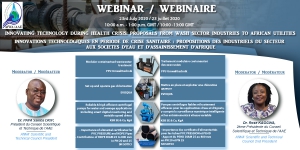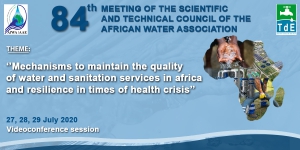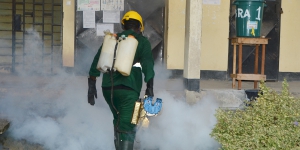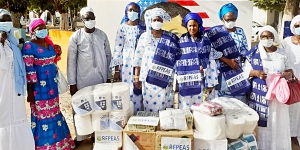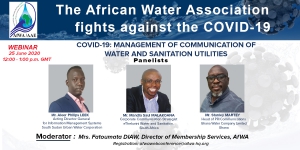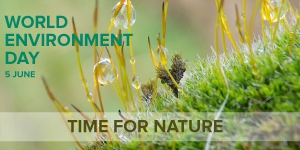Nzickonan Stéphanie
World Water Forum : A unique platform for the water community and decison-makers
Created in 1996, the World Water Council is the founder and co-organizer of the World Water Forum and catalyzes collective action during and in between each Forum.
The World Water Forum is the world's largest event on water. It has been organized every three years since 1997 by the World Water Council, in partnership with a host country. The 9th Forum will be the first of its kind to be hosted in sub-Saharan Africa.
By bringing together participants from all levels and areas, including politics, multilateral institutions, academia, civil society and the private sector, among others, the World Water Forum provides a unique platform where the international water community and key decision makers can collaborate and make long-term progress on global water challenges.
Read more here: https://www.worldwaterforum.org/en
AfWA’s Corporate Members capacities building: 24 Communication Directors develop their knowledge in public relations, social network and advocacy
In its mission for promoting actions in terms of cooperation and exchange through its programs, the Scientific and Technical Council (STC) of the African Water Association (AfWA), and its Specialized Committee for "Administration and Management", provides its members with capacity building through seminars, technical and professional training sessions, master classes, symposia and study tours.
In this framework, AfWA, thanks to the funding of its partner the German Water Partnership (GWP), did organize from 10 to 14 August 2020, a capacity building workshop for its corporate members' Communication Directors and Officers.
24 participants including 20 from 20 member utilities and 4 AfWA staff members were invited to be part of this online training on the following themes: Public Relations, Management of Social Networks and Advocacy.
The training was led by Mr. Patrick BESSLER, Communication Manager at German Water Partnership, who showed an excellent command of the subject and a definite disposition to listen to the participants.
Thus, through PowerPoint presentations and group work, the trainer was able to make this framework a real opportunity to share experiences. As for the communication managers, they showed a lot of enthusiasm to learn from each other and a great motivation to restitute the group work.
It is good to know that this training is the beginning of several others to be planned by German Water partnership for the benefit of all AfWA’s Members.
About the German Water partnership :
The German Water Partnership (GWP) is an internationally oriented network of the German water sector that brings together around 350 companies, professional Associations and institutions from the fields of economy, science and research.
About the partnership between AfWA and the German Water Partnership
The cooperation between the AfWA and the German Water partnership started in 2012 and materialized in 2019 through the signing of a partnership agreement which consists, among other things, of exchanging expertise, consultancy and capacity building.
84th AfWA Scientific and Technical Council Session: WASH sector experts discuss the quality of water and sanitation services in times of health crisis
Despite the health crisis caused by COVID-19, which is shaking the world and limiting travel, the African Water Association honored its commitments towards its members.
Indeed, the 84th meeting of the Scientific and Technical Council (STC) which was to be held in a face-to-face meeting in Lomé, Togo, turned into a videoconference meeting from 27 to 29 July, 2020.
Sponsored by TOGO’s Water Corporation (TdE), this meeting gathered more than 150 AfWA’s members under the theme "Mechanisms for maintaining drinking water quality and sound sanitation services in Africa, and resilience during health crisis".
At the opening of the meeting, the Managing Director of the TdE, Mr. Gbati YAWANKE WAKE, in his speech, drew the picture of numerous challenges to face by African companies dealing with water production and supply, at this time of health crisis, before stating that "...drinking water is the must-have convenience for washing hands with soap, the basic barrier action for responding to the pandemic linked to Covid-19. (...) As industrial and human activities slow down during the health crisis, those of water and sanitation services become more intense, and quality more crucial".
After him, the Scientific and Technical Council (STC) chairman, Dr Papa Samba Diop, pointed out that the Covid-19 crisis confirmed the extent to which the health systems of African countries are, and how public policies related to water and sanitation should be more proactive. He reiterated the Association's commitment to the world in terms of seeking, finding, proposing solutions and implementing responses, in time and out of time, to address the water and sanitation crisis that Africa is facing. Dr Papa Samba Diop acknowledged many efforts made by politicians and the WASH community to improve access to the resource; however, he said, "there are still about 320 million people on the continent who do not have access to safe drinking water, and 695 million people in sub-Saharan Africa who do not have access to adequate sanitation". He went on to say: "As long as there is only one person on our continent who is subject to the chore of fetching water or the practice of open defecation, our work must continue".
The opening ceremony was followed by the high-level panel during which the experts explained that in view of the current health crisis, water and sanitation utilities should focus on the conditions of access to the most vulnerable populations. According to them, there is a need to strengthen advocacy, partnership and collaboration with other sectors such as health, education and policy makers to increase the share of the budget allocated to water and sanitation.
The following day was devoted to the work of the specialized committees and the closing ceremony of the STC took place on Wednesday, 29 July 2020 after the presentation of the reports of the various committees.
The 85th session of the AfWA Scientific and Technical Council will take place in November 2020.
It should be noted that the Scientific and Technical Council is one of the operational bodies of EFA. Its mission is to identify, discuss and propose solutions to the managerial, scientific, technical or environmental challenges that the members of the Association may face.
84th STC meeting, water and sanitation industrialists present their technological innovations
As a prelude to the 84th meeting of the Scientific and Technical Council (STC), the African Water Association organized, on Thursday 23 July 2020, a panel discussion with some of its Affiliate Members, mainly innovating technology providers in the WASH sector. The panel was under the theme " Which innovative solutions for African water and sanitation utilities in a period of acute pandemic crisis?". Its objective was to introduce water and sanitation utilities, members AfWA, to the new technologies and innovative solutions developed by the sector's industrials to help them address COVID-19 challenges.
Under the moderation of Dr Papa Samba Diop, President of the STC, in front of a hundred participants from about 30 water and sanitation utilities, and a few participants who are not yet AfWA’s members, four industrials took turns at the microphone to present innovative solutions.
Mr. Fabrice PELLOTE, sales manager at Evoqua Water Technologies, a company known for its disinfection equipment, manufactured and marketed worldwide and particularly in Africa, presented chlorine gas injection equipment enabling water to be disinfected in both small and large drinking water plants.
Mr. GUNTER MATERLOCK, international sales manager at PPU Umwelttechnik from Germany, a company specialized in the production and marketing of wastewater treatment products, talked about Modular Containerized Waste Treatment.
Mr. Peter WEBER, Managing Director of KSB Pumps & Valves (pty) LTD. South Africa, and Vice President for Sub-Saharan African Region, presented the reliable and highly efficient centrifugal pumps for water and sewage applications, including intelligent digital monitoring and variable speed drives.
Mr. ELIAS ASSAF, Sales Manager at SN SOTICI, a Côte d’Ivoire based company showed how important is the feed certificates for PVC PRESSURE and HDPE pipes and the contribution of HDPE DIAM 25 to 800 mm in PN 20 and PN 25.
At the end of the conferences, many participants were delighted with this panel which showed to be a good opportunity for them to discover new solutions to improve their operations.
COTE D'IVOIRE: 84th meeting of the Scientific and Technical Council (STC) of the African Water Association (AfWA): from 27 to 29 july 2020, by video conference!
The African Water Association is pleased to inform its members and partners, the representatives of African governments and municipalities, enterprises, as well as all actors and stakeholders in the water, sanitation and environment sector, that the 84th session of its Scientific and Technical Council, will be held from 27 to 29 July 2020, by videoconference, under the theme: Mechanisms for maintaining water quality and sustainable sanitation services in Africa, and resilience in times of health crisis.
in ordr to take into account the Covid-19 pandemic, and also to fulfil its commitments towards the water and sanitation community, AfWA innovates by organising, for the first time in its history, this STC meeting, in virtual mode, under the sponsorship of the Togolese water company (TDE).
AfWA invites its members as well as all the actors and stakeholders in the water, sanitation and environment sector to save the date for a strong participation in this continental meeting of the sector.
The registration's links for the meeting will be communicated to you later.
Fight against the COVID-19: Women Water and Environment Professionals in Cameroon disinfect a high school in Douala
As part of the response to the Covid 19 pandemic, the Association of Professional Women in Water and Environment of Cameroon (AFPEEC), donated 1 200 masks and 10 boxes of soaps at the Bilingual High School of Nylon Brazzaville in Douala, on Wednesday 17 June. The handover ceremony was followed by the disinfection of 57 classrooms, administrative blocks and the school’s toilets.
This activity was carried out thanks to the support of Seca Environnement, a sanitation company, whose Managing Director, Mrs. Arlette Tchapoya, herself a member of AFPEEC, graciously made disinfection trucks and teams available to the Association.
This action is the first large-scale action since the beginning of the year and despite this very trying period of sanitary crisis.
It should be noted that the disinfection of the School will be done again in 30 days.
Fight against the COVID-19: Donation from the Women Water and Sanitation Professionals of Senegal, at the J. F. Kennedy High School
The Network of Women Water and Sanitation Professionals of Senegal (RFPEAS) donated liquid soaps, lump soaps, bleach, hydroalcoholic gels, hand wash, sanitary towels, towels, and masks to the Association "Toujours Kennedyiennes". The ceremony took place this Wednesday, June 24, 2020 on the premises of the establishment.
This donation is a way to help the school’s administration and students observe the preventive measures during this Covid-19 pandemic. "As we must learn to live with the virus while protecting ourselves, classes are resuming in a context where we must remain vigilant. We therefore tell our daughters and sisters who attend this reference school not to lower their guard. “Scrupulously respect the advice and instructions that your teachers and supervisors will give you so that the virus does not find a favorable ground in your school," said Ms. Fatou NDIAYE, President of RFPEAS. "In times of fear caused by the disease, action can heal from fatality. We do not have the right to resign. We have the duty to act, we of the network and you, Kennedyiennes of yesterday and today, to be fairer, Kennedyiennes of always," she added. The Kennedy High school "is a strong symbol of excellence in the school environment and an academy of role models in professional life," she said before inviting young girls to consider a career in science to meet the challenge of sustainable development: "We hope that many of you will come to join us after your studies to work in a very rewarding sector, one that provides drinking water, this vital liquid, and also to ensure essential sanitation for human dignity. A challenge that, daily, gives the immense joy of contributing to the quality of life".
The contribution of the RFPEAS was welcomed by the school's alumni, the student representative, and the headmaster.
The Network of Women Water and Sanitation Professionals of Senegal (RFPEAS) was created in December 2017. At the local level, it is a body of the African Water Association (AfWA) that decided to integrate the gender dimension in its activities. "AfWA has understood, today, without a doubt, that women have an important role to play in global governance for the achievement of the Sustainable Development Goals (SDGs), after the Millennium Development Goals (MDGs)," added Mrs. Ndiaye. The RFPEAS thanked all its sponsors. The General Management of SONES was represented at this ceremony by Mr. Alioune FALL, Acting Director of Human Capital, and Mr. Habib Demba FALL Advisor in Communication, Awareness Raising and Public Relations.
Fight against the Coronavirus (COVID-19) pandemic : SOMAGEP SA manufactures a hydroalcoholic solution for hand disinfection
As part of the fight against Coronavirus or COVID-19, SOMAGEP-SA has manufactured a hydroalcoholic solution for hand disinfection.
The Company is writing a new page in its history through this scientific prowess achieved by its Central Laboratory.
On Wednesday 29 April 2020, the National Health Laboratory of Mali issued SOMAGEP-SA with a certificate attesting to the quality of the hydroalcoholic solution it manufactured in its Central Laboratory, located in Djicoroni Para, for hand disinfection, as part of the fight against the Coronavirus (COVID-19) pandemic.
The solution, made in SOMAGEP-SA, is composed of Ethanol 96%, Glycerol 96%, Hydrogen Peroxide or Hydrogen Peroxide 3% and distilled water in Sufficient Quantity For (QSP). These standards are those recommended by the World Health Organization (WHO) in its protocol for the manufacture of hydroalcoholic solutions to disinfect hands against Coronavirus.
According to the Head of Department of the Central Laboratory, Sidy Patrice DIALLO, to achieve a hydroalcoholic solution, an alcohol content of 80% is required, 1.40% glycerol and 0.125% hydrogen peroxide. "After manufacturing the solution, we sent a sample to the National Health Laboratory to certify its conformity. Thank God we got the certificate of analysis. Today, our Laboratory is entitled to produce the hydroalcoholic solution according to its capacity" said Mr. Diallo.
Let us recall that this initiative to produce the Hydroalcoholic Solution comes from an instruction of the Crisis Unit, chaired by the General Director of SOMAGEP-SA, Boubacar KANE. The cell was thinking about finding solutions to minimise the expenses related to the management of the coronavirus crisis on SOMAGEP-SA's treasury.
Webinar on Communication in the Context of Covid-19
Since the beginning of year 2020, the coronavirus virus, Covid-19, which first appeared in China at the end of year 2019, turned from an epidemic to a pandemic worldwide. This situation created an unprecedented health crisis, but also a very largely disrupted environment, due of course to the number of rapid and very large-scale infections, which forced governments and companies to take sound crisis management measures. In such a context, communication is considered to be of high importance for effective monitoring and implementation of all taken measures, with the aim of reducing the spread of the disease and ensuring survival activities. As for water and sanitation utilities, supplying drinking water and providing sanitation services continuously, is a huge challenge to overcome, since it’s important to be able to easily handle internal, external as well as institutional communication to provide customers and utilities’ staff with the right information , at the right time, via the best channel, when we all know that poor management of your communication can damage your company image, even for long term. How are the communication departments of water and sanitation utilities handling this situation? It’s to share these communication challenges and solutions as well as AfWA’s perspectives, through its experts’ network, is organizing a webinar in the form of a panel discussion on June 25, at 12:00 p.m. GMT.
Goals
The objective of this discussion is to allow panelists to share experiences of water and sanitation utilities in terms of communication management in case of emergency and crisis, as it is now in the COVID-19 pandemic context. What are the challenges and solutions to maintain a fair, relevant and permanent communication both internally and externally, to preserve the brand image of the company as well as the health of the workers and customers. It will also be question of understanding the lessons that can be drawn from this health crisis, in terms of communication.
Expected results
At the end of the panel, participants will be able to assess the importance of crisis and emergency communication, as well as considered solutions to easily circulate the good information during the pandemic. The panelists will also learn from each other and better their communication actions.
It’s time to wake up
The foods we eat, the air we breathe, the water we drink and the climate that makes our planet habitable all come from nature. Yet, these are exceptional times in which nature is sending us a message: To care for ourselves we must care for nature. It’s time to wake up. To take notice. To raise our voices. It’s time to build back better for People and Planet. This World Environment Day, it’s Time for Nature.

 English
English  Français
Français 
